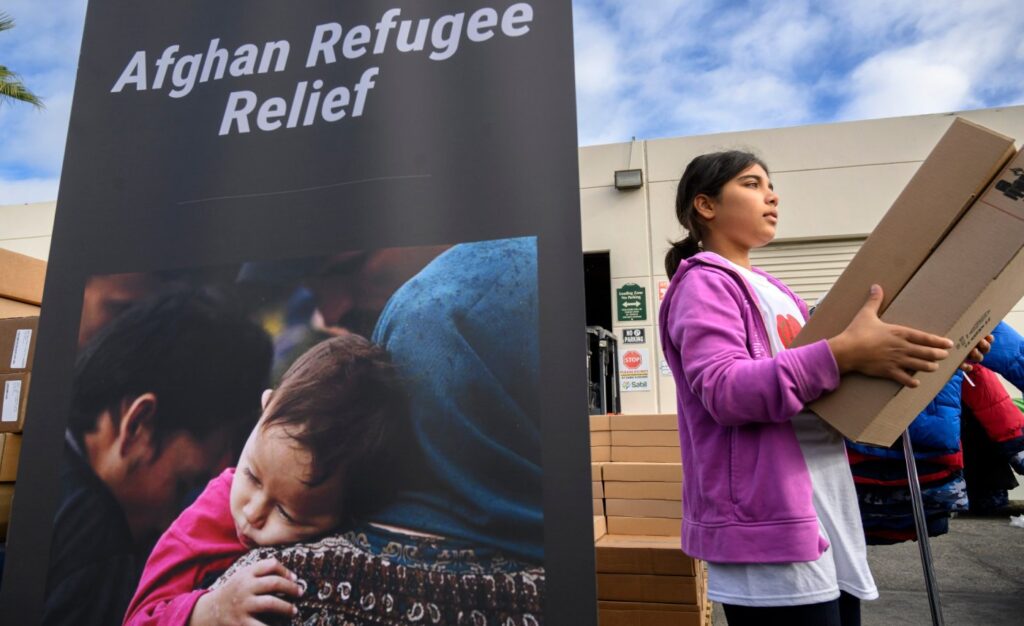
Recently I facilitated an anti-bullying workshop for immigrant students who live in Orange County. It’s one of the most popular programs run by Project Atom, a nonprofit that helps immigrants in high school and college mentor younger new arrivals. It’s exactly the kind of support I wish I’d had when I arrived in Westminster as a 10-year-old Afghan refugee in 2015.
I’ll lead students through role-playing scenarios about how to react if someone makes fun of their accent or the ethnic foods they bring for lunch. But this year, the discussion was more serious. Our group of kids from the Middle East and South America included an eighth grader from Afghanistan. He’d been attacked by a fellow student the first week of school and was healing from a broken arm and collarbone. The other kids wanted to know: “Should he have punched the other guy back?”
“Absolutely not,” I said. “He should immediately tell a teacher.” And yet I worried this advice might not be enough. “Bias-motivated hate activity” surged in Orange County middle and high schools between 2021 and 2022, according to the OC Human Relations Commission. It’s now getting worse, with increased incidents against both Muslims and Jews around Los Angeles since the start of the Hamas-Israel war.
Schools must take this bullying seriously. They need to adopt a policy of zero tolerance and punish offenders. They should train students to step in when they witness bigotry, which studies show is an effective anti-bullying tactic. And they should create programs to teach new immigrant and refugee students—and anyone who feels attacked on the basis of identity—how cope with the hostility they’re facing.
If you’ve been bullied, you know how much it hurts. In middle school, a classmate called me a terrorist because I was from Afghanistan. He pretended it was a joke, but I was devastated. We’d fled my native country because my father had helped the American government as a contractor with the U.S. Agency for International Development and feared we would be targeted as the number of civilian deaths surged.
The student in my anti-bullying workshop was in a similar situation. Two years ago, his family dodged Taliban airstrikes as they escaped the fall of Kabul.
I had a difficult time getting used to American life. I didn’t know English or understand the informal way that students often spoke to teachers. I had no idea how to talk to girls in middle school—hard enough for any student but extra challenging for immigrants who came from sex-segregated schools. Even wearing sneakers and jeans felt strange; I was used to sandals and loose-fitting clothes.
I became a Project Atom volunteer my sophomore year of high school to help other kids like me. During our weekly tutoring sessions at four Orange County middle schools and monthly workshops, we help the younger kids navigate cliques and social exclusion. We teach them how to stand up for themselves and manage the anxiety they feel about what’s happening in the world.
Related Articles
Sorry, urbanists, but bicycles will never save the planet
Newsom-backed Proposition 1 is the wrong solution to homelessness, mental health
Americans want a ceasefire in Gaza. It’s our politicians who are out of touch.
Honor veterans and work for peace
Will Gavin Newsom wind up as one of California’s unpopular ex-governors?
I got to know the Afghan student because his family’s case manager at the resettlement agency World Relief told him about our group. I could immediately relate when he said he’d been having trouble making friends last year. But over the course of our meetings, I saw his confidence grow. He’s since opened up and has developed a reputation for hugging all the volunteers. We were all shocked and saddened to hear about his attack back in August. Since then, I’ve been thinking a lot more about what schools should do to combat such bigotry.
Project Atom is part of a growing student-led movement to help immigrant kids belong. But we’re teenagers—I’m one of the oldest at 19—and we can only do so much. President Biden’s recent announcement that the White House is launching a national strategy to combat “Islamophobia” is an important step, as is his repeated condemnation of antisemitism. But we also need the support of teachers, administrators and parents. Schools and families must step up and send a message: We don’t tolerate hate here.
Ahmad Sarwari is a sophomore at Cypress College, where he’s studying psychology and public health science.
